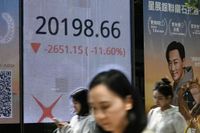The global financial markets are in turmoil as the Amsterdam stock exchange, known as the AEX, suffers its most significant daily loss since the onset of the coronavirus pandemic in 2020. On Monday, April 7, 2025, the AEX plummeted approximately 6 percent, following a decline of over 4 percent the previous Friday. This downward spiral is largely attributed to the escalating trade war initiated by American President Donald Trump, which is causing widespread panic among investors across the globe.
The AEX index opened at 790.99 points, marking a drop below the crucial 800-point threshold for the first time since January 2024. This decline, while severe, does not place it among the top ten largest losses in AEX history. The most significant daily loss occurred on Black Monday, October 19, 1987, when the index lost 12 percent. In comparison, the current market turmoil, while alarming, falls short of the dramatic losses witnessed during the financial crisis of 2008 and the pandemic's initial impact in March 2020, when the AEX dropped nearly 11 percent.
As the AEX falters, the ripples of the trade war are felt worldwide. The Hang Seng index in Hong Kong experienced a staggering drop of 12.5 percent, the largest decline since the Asian financial crisis in 1997. Meanwhile, the stock exchange in Taiwan recorded its biggest loss ever, plummeting nearly 10 percent. Other major Asian markets also saw significant declines, with the Shanghai stock exchange down more than 8 percent and the Nikkei in Tokyo down over 6 percent.
Amid this chaos, Dutch Minister of Foreign Trade, Reinette Klever, expressed her concerns regarding the U.S. trade tariffs. "It is important to remain calm," she stated, highlighting the need for dialogue with American officials. The EU ministers are set to convene to discuss potential responses to the new 20 percent import duties imposed by Trump. Klever emphasized that trade is vital for the Netherlands, accounting for a third of the nation's earnings, and that a balanced approach is essential to mitigate any financial pain across EU member states.
In response to the escalating tensions, the Vereniging van Effectenbezitters (VEB), an association for investors, cautioned against the EU imposing retaliatory tariffs that could exacerbate the situation. Adjunct Director Erroll Keyner urged for a measured approach, arguing that the EU should not add "fuel to the fire" of the trade conflict. Keyner acknowledged the current market losses as justified in light of Trump's aggressive trade policies but warned that further escalation could lead to even steeper declines.
Meanwhile, the financial losses attributed to Trump's trade war have already reached an estimated 10 billion dollars in the U.S. alone, surpassing the damages incurred during the worst week of the 2008 financial crisis. Billionaire investor Bill Ackman characterized Trump's actions as an "economic nuclear war," warning that the president risks losing the trust of the international business community. Ackman called for a pause on the tariffs and for trade disputes to be resolved through negotiations, emphasizing the potential long-term damage to the U.S. economy and its global standing.
The turmoil is not limited to traditional stock markets; the cryptocurrency market is also feeling the heat. Bitcoin's value has plummeted to around 77,200 dollars, down 7.5 percent from the previous day, and significantly lower than its record high of over 109,000 dollars on January 20, 2025, the day of Trump's inauguration. Other cryptocurrencies, including ether and XRP, have also seen steep declines, with losses around 15 percent.
As the situation unfolds, investors are flocking to trading platforms for information, causing significant traffic and accessibility issues on popular investment websites. Pieter Kort, head of content at IEX Group, noted that the surge in visitors is indicative of the heightened anxiety among investors trying to navigate the volatile market landscape.
Amidst the uncertainty, fears of a repeat of Black Monday loom large. Analysts and market commentators have expressed concerns that the current trajectory could lead to a significant market crash akin to the one experienced in 1987, where Wall Street lost approximately 500 billion dollars in value. The stakes are high, and both investors and policymakers are bracing for potential fallout.
Trump, however, remains steadfast in his approach. In a post on his platform Truth Social, he referred to the import tariffs as "wonderful to see in action," suggesting that they are a necessary remedy for America's substantial trade deficits. He acknowledged the market declines but framed them as a temporary setback in the pursuit of a stronger economic position for the U.S.
As the trade war intensifies, the implications for the global economy are significant. The interconnectedness of markets means that the actions taken by one nation can have far-reaching effects on others. The EU's response to Trump's tariffs will be closely watched, as member states weigh the benefits of retaliatory measures against the risks of further destabilizing an already fragile economic landscape.
In summary, the financial markets are experiencing unprecedented volatility as a direct result of Trump's trade policies. The AEX's significant losses reflect broader concerns about the potential for a global recession, while Asian markets are also grappling with the fallout. As investors seek clarity amidst the chaos, the need for diplomatic engagement and measured responses becomes increasingly critical.







